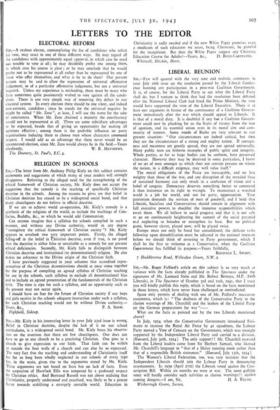ELECTORAL REFORM
LETTERS TO THE EDITOR Sm,—A zealous elector, contemplating the list of candidates who solicit his vote, may react in one of three different ways. He may regard all the candidates with approximately equal ppproval, in which case he need uet trouble to vote at all ; he may decidedly prefer one among them, in which case his course is clear ; or he may conclude that he would prefer not to be represented at all rather than be represented by one of those who offer themselves, and wht is he to do then? Our present system may be said to allow the expression of universal affirmative judgement, or of a particular affirmative judgement, but not a universal negativt. Unless my experience is misleading, there must be many who have sometimes quite passionately wished to vote against all the candi- dates. There is one very simple way of removing this defect in our electoral system. In every election there should be one silent, and indeed non-existent, candidate ; since he stands for the universal negative he might be called "Mr. Zero "; at least, I will use the name for the sake of conciseness. When Mr. Zero obtained a majority the constituency would not be represented at all. There are some subsidiary advantages to be expected, beside that of giving an opportunity for making all opinions effective ; among them is the probable influence on party organisations inducing them to choose men whose characters command respect. I would add as an advantage that there never would be an uncontested election, since Mr. Zero would always be in the field.—Yours






















 Previous page
Previous page